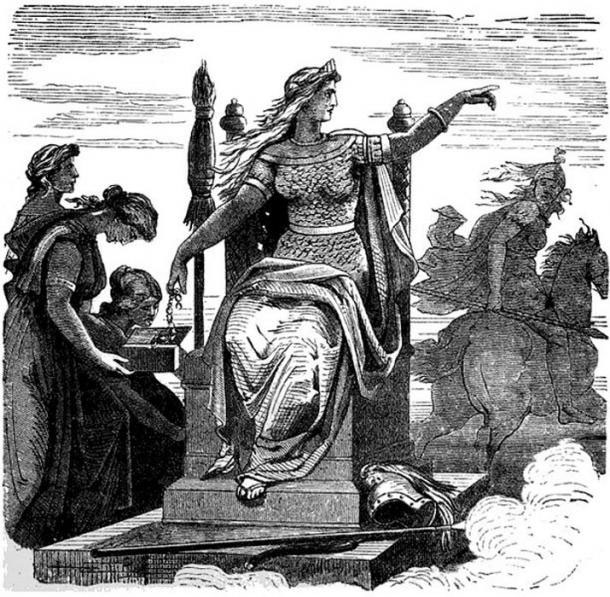Arguments abound about the queen of the Queen of the Aesir Gods, Frigg. Is she both Frigg the goddess of the Aesir and Freya the goddess of the Vanir? Scholars have proposed this connection. With a name that means “beloved,” as Odin’s wife Frigg is “first among the goddesses,” the goddess of the sky responsible for “weaving the clouds.” She was known as the deity of fertility, household, motherhood, love, marriage, and domestic arts. She is the mother of the god Baldur and the English weekday name ‘Friday’ is derived from her name. Foresight is her domain: Frigg has the power of prophecy, can weave the fates of man, but circumspect and wise, she never reveals what she knows about the future. Frigg oversees marriage sanctioned by society, while Freya’s domain is that of unsanctioned marriages. Because of this supervision she is regarded as a protector of home and families. She is the only god other than Odin who is permitted to sit on his high seat “Hlidskjalf,” and look out over the universe. Frigg is basically the housewife character, while Freya is more of a hunter, Earth Mother.
This was the goddess of peace and maintenance of social order. Frigg dwells in the palace of mists Fensalir with her husband Odin. She was known as the “Lady of the Hall,” whose duty it was to carry the mead horn around feasts that were thrown to send off or welcome back warriors. This association with feasting made her a patroness of diplomacy, and Frigg’s support was enlisted for mediation. As the queen, Frigg serves as a role model for her female followers and home and hearth is her realm. The goddess is often called upon by her devotees for aid in the domestic arts, in particular the spinning of wool. Frigg herself uses the wool of cloud sheep to weave and spin Aesir garments. Frigg was the ultimate Mother. The longest night of the year is known as ‘Mother Night,’ and it was believed that this was the night Frigg gave birth to Baldur, the god of light and joy. She worked to protect him and traveled to hell to bring him back to life. She stood up to her husband and even tricked Odin upon occasion to get her way. Frigg’s household included other goddesses: Lin guards those of mankind whom Frigg desires to preserve from harm. Fulla, a maiden with long flowing hair and a golden chaplet about her brow, carries Frigg’s eski (an ashen box), keeps watch and ward over her shoes, and shares her secrets. Gna runs errands for Frigg through the nine realms, especially in matters requiring dispatch, riding the horse Hofvarpnir through the air.
Frigg/Freya had a mind of her own and is accused of infidelity to Odin. Freya’s wild sexual practices are chronicled as well as the medieval Danish historian Saxo Grammaticus assertion that Frigg slept with a bed slave. In the Sagas, Odin was once exiled from Asgard, leaving his brothers Vili and Ve in command. In his absence they regularly slept with Frigg until Odin’s return. Frigg is portrayed as a völva, a practitioner of the Viking Age magic known as seidr. Seidr involved perceiving the course of fate and working with it to bring about change, often by symbolically weaving new events into being. Frigg was the most masterful weaver in the cosmos, and this seidr power could potentially be put to any imaginable use. Frigg owns falcon plumes that she and the other Aesir use for shapeshifting into that bird.
In the Viking Age, the völva was a wandering seeress and sorceress who traveled performing acts of seidr in exchange for lodging, food, and other forms of compensation. Her social status was vague, sometimes feared, praised, desired, appeased, admired, or despised. One of the core institutions of the time was the warband, a tightly organized military group led by a chieftain and his wife. The wife of the warband’s leader foretold the outcome of any war plan by means of divination, as well as influenced the outcome through active magic, and served a special cup of liquor that was a powerful symbol of both earthly and spiritual power in the warband’s ritual feasts. These customs were clearly an interpretation of Frigg’s Lady of the Hall role in Asgard with Odin as the Supreme warband leader.

